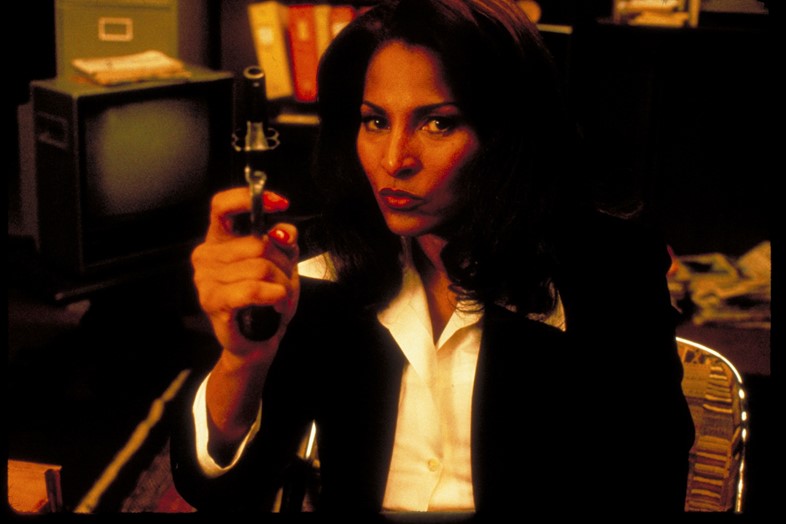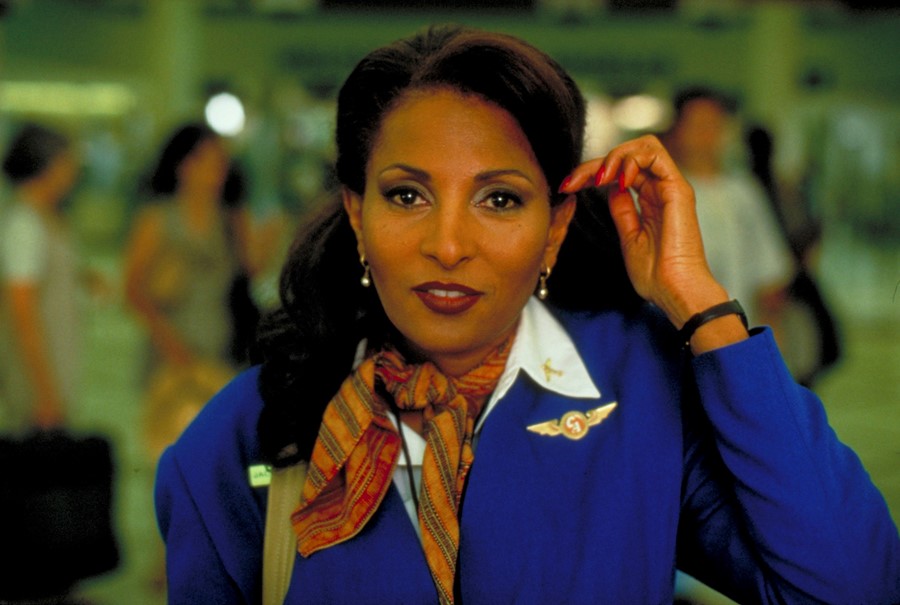Back in cinemas this week, Quentin Tarantino’s third film might just be his best – and his most perceptive on the topic of race
In 1997, three years after Pulp Fiction made a superstar out of Quentin Tarantino, Jackie Brown met with a reception that was cool-bordering-ice-cold. “Too long,” wrote Variety. “Slow,” whined the San Francisco Chronicle. “Straight to video material,” hissed Slate’s David Edelstein. Watching the film as a teenager, I remember leaving the cinema feeling similarly nonplussed: the tone felt muted, missing the exuberance of old and the self-consciously quotable dialogue that teenage boys tend to go in for. (Then Guy Ritchie came along, and it was a case of careful what you wish for – but that’s another story.)
25 years on, such complaints seem almost perverse; it’s as if critics were ragging on Tarantino for giving them the one thing he’d yet to muster: emotional depth. Now, everyone from PT Anderson (“It reduces me to tears”) to Samuel L Jackson (“It’s about adults”) reckons it’s his best, the film’s retrospective admirers pointing to the same ‘faults’ reviewers found with it in the first place: too slow? Its unhurried pace is what makes it smoulder. Too ‘linear’? Tarantino had reached a point in his career where he didn’t have to hit people over the head with his talent, so instead set about integrating his knack for narrative invention into a story modelled along more classical lines. It’s also, according to this new consensus, the first of his films to be at least as much about people as it is about his all-consuming obsession with movies, a proposition Tarantino seems to have largely backed away from in the films that followed.
All of these things are true, and yet what tends to get lost in the mix is that Jackie Brown is also Tarantino’s most insightful film on race, interrogating his white suburban kid’s often-problematic obsession with Black culture in a way that is heartfelt and smarter than his occasionally cloth-eared protestations in public would seem to allow. (When Spike Lee complained about his overreliance on the word ‘n***a’ in his screenplay for the film, Tarantino responded that Lee’s attempts to police his writing of Black characters was “racist”, which makes him sound like your common or garden ‘All Lives Matter’ twit.)
Key to this more thoughtful approach is the casting of a 44-year-old Pam Grier – supervixen star of Blaxploitation films like Foxy Brown and Coffy – whom Tarantino’s camera follows around like a lovelorn puppy, awe and unrequited lust palpable in every frame. “Are you scared of me?” Jackie asks her (white) love interest Max Cherry (Robert Forster) towards the end of the film. “A little bit,” says Max, and he could just as easily be speaking on behalf of Tarantino.
In the title role, Grier plays a middle-aged flight attendant with a side-hustle smuggling cash into the country for arms dealer Odell Robbie (Samuel L Jackson). When the cops catch her in the act, she offers to help them nail Odell with a bag-swap scheme, while secretly playing all parties off each other in a bid to walk away with the money scot-free. Tarantino adapted the story from Elmore Leonard’s novel Rum Punch, and directs all the crime-caper stuff with crisp aplomb, but it’s his decision to make the protagonist a Black woman that distinguishes it from the source text, and gives the film its subtle punch. Grier brings all her signature statuesque presence to the film, and a newfound vulnerability, too – there’s a wonderful moment during a big set-piece when she glimpses herself in a changing-room mirror wearing a businesswoman’s suit, and a lifetime of disappointment stares back. It’s a scene that speaks to the film’s themes of ageing and reinvention, but also of race: it’s easy to imagine Jackie, consistently the smartest person in the room, having some prior misdemeanor on her rapsheet that prevents her from pursuing a career. But of course, that’s what makes Jackie all the more determined to cheat fate, and spare us the liberal hand-wringing version of events.
While Jackie’s own self-reckoning is poignant, it’s the interaction between the film’s Black and white characters that provide some of the slyest moments in the film, as perceptive in their way on the pathology of US race relations as Jordan Peele’s Get Out. Forster’s character in the movie, Max Cherry, is a world-weary bail bondsman who seems straight out of the old west: when Odell asks him to get Jackie out of jail without upfront payment by way of a sob story, he replies curtly, “Is white guilt supposed to make me forget I’m running a business?” Max’s relationship with Jackie is contrasted with that of Ray (Michael Keaton), a blowhard cop in wraparound shades whom Jackie jokes with Max is always trying to act ‘cool’ around her. He’s like Norman Mailer’s ‘White Negro’ figure, the Black culture-appropriating hipster Tarantino’s spent his whole career trying to live down, while Max – straight-laced, impassive, respectful but admitting of absolutely no bullshit – is held up as his opposite.

Odell, a career criminal who maintains a transactional approach to all relationships, is naturally suspicious of ‘whitey’: he knows that the hot surfer girl, Melanie (Bridget Fonda), living in his house would sell him out in a heartbeat, but he keeps her around because, after all, she’s “white”. At Cherry’s office, he questions a picture on the wall of Max looking chummy with a “big Mandingo-looking n***a”, who turns out to be an employee. “Bet it was your idea to take the picture, wasn’t it?” he asks with a leer. Later in the film, when the two are riding in a car en route to a showdown with Jackie, Max puts on a tape of Philly soul group the Delfonics, which he bought after Jackie turned him on to their music. Odell eyes him warily, sharing his surprise at Max’s taste in music. “They’re pretty good,” says Max, leaving Odell to stew on the possibility that the two are romantically involved, and he’s about to be set up.
Tarantino scrupulously avoids making Max a white saviour in the movie, emphasising his role as a “junior partner” in Jackie’s plans to take back control of her life by stealing the money. But where things get sticky is that Jackie Brown is a white-saviour story of sorts, if you allow for the fact that said white saviour is standing behind the camera. After all, Tarantino knew he was handing Grier – who by the mid-90s was taking mostly bit-part roles in films of middling distinction – another shot at a career by giving her the job. It’s an opportunity she seizes with both hands, giving the film a lived-in cool and emotional shading Tarantino couldn’t get near with his earlier, showier efforts, and if it’s a move that complicates the film’s social commentary, you’d have to say it’s one that paid off.
Perhaps it’s Tarantino’s white guilt that informs the ending, where Max declines to take off with Jackie to Spain. Max reminds us on multiple occasions over the course of the film that he’s fed up with his lot in life, and his attraction to Jackie is plain before she even makes it through the prison gate. Why, then, wouldn’t he choose an early retirement of hot sex and siestas with a living goddess and half a mil cash at his disposal? Well, he might: he seems halfway to changing his mind as Jackie takes off in the car. It’s as if Tarantino is torn between preserving Jackie/Grier as an emblem of Black ‘cool’ and allowing her to step off the screen as a fully-fledged human – and as ever with Tarantino, the lure of fantasy is only too real. But Jackie Brown at least leaves the door ajar, a suitable ending for a film finally getting its due as the director’s masterpiece.
